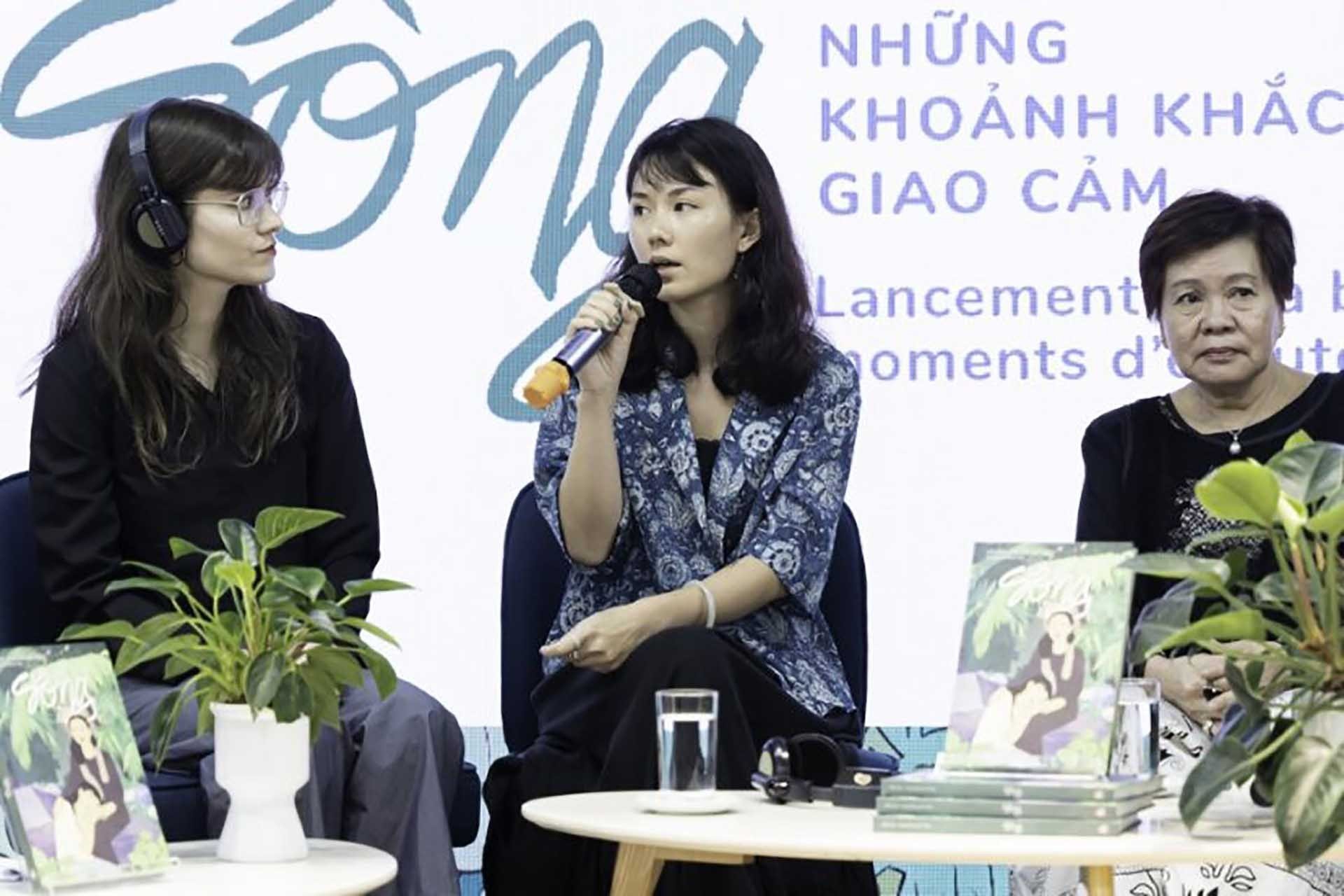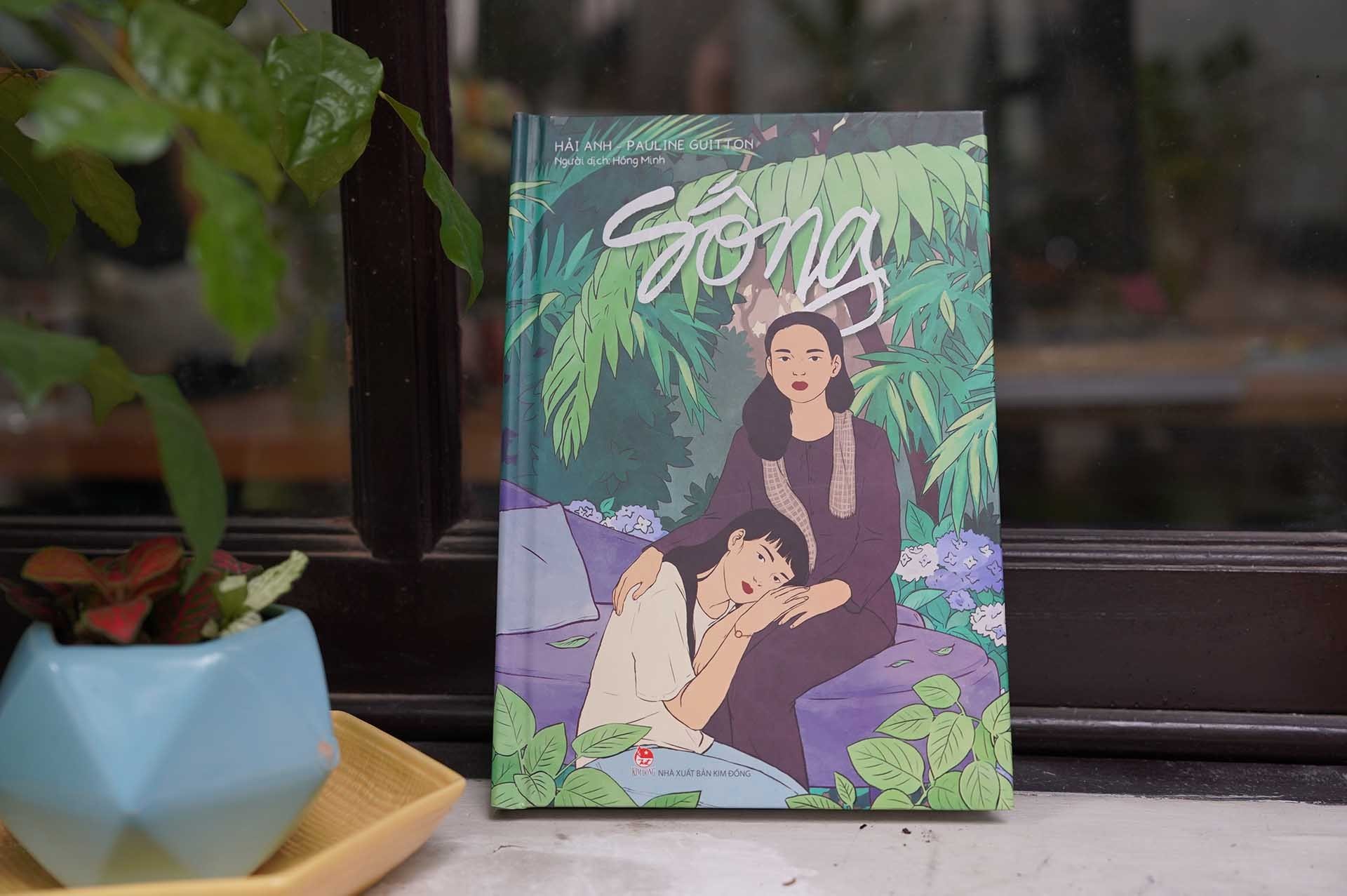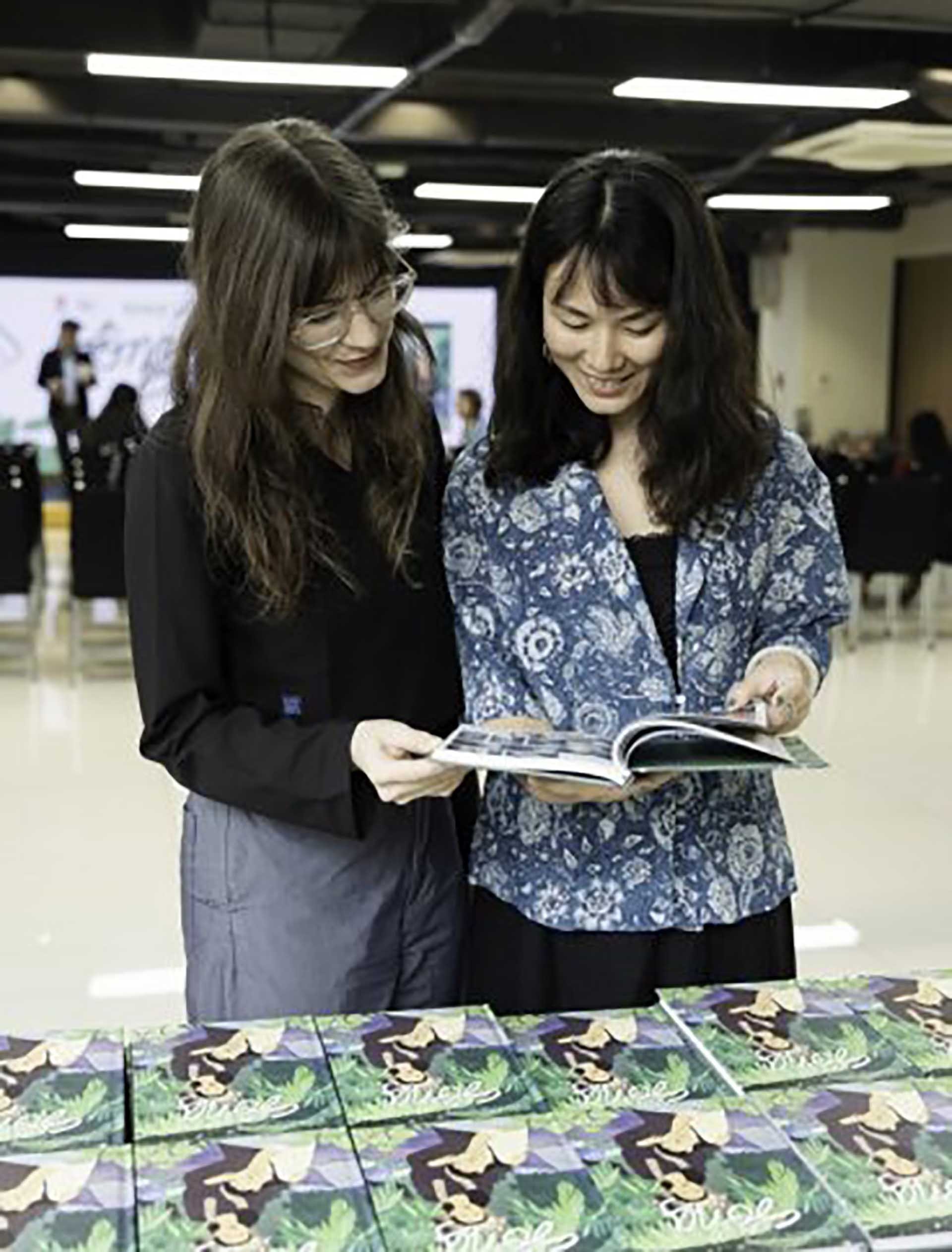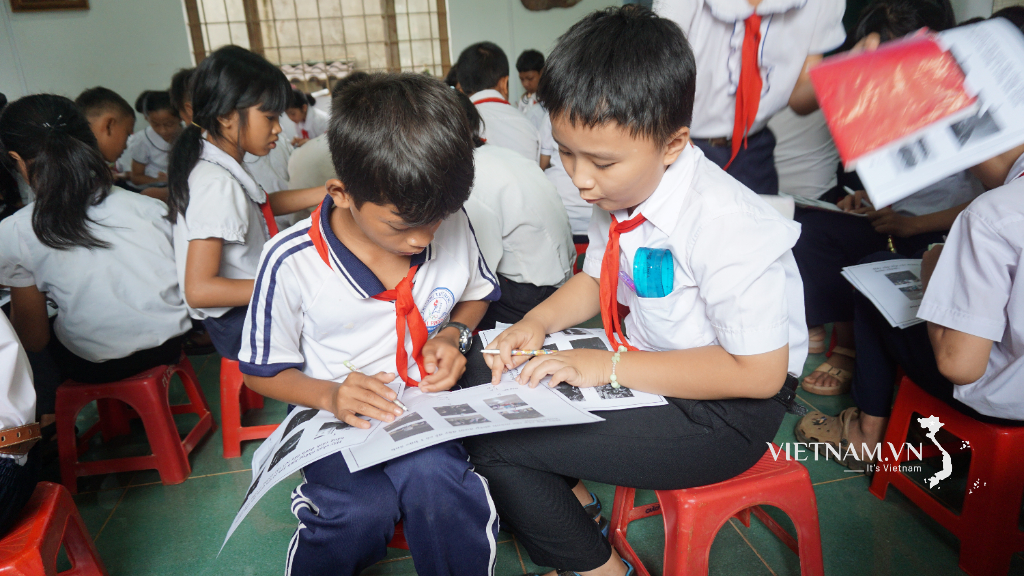Throughout the process of creating the comic book "Living," author Hai Anh discovered aspects of her mother (director Hai Linh) that she didn't know, as well as parts of Vietnamese history and culture that she had never heard of...
 |
Author Hai Anh (center) at the book launch in Vietnam. (Photo: Giang Ngoc)
Sharing with TG&VN , Hai Anh said that she now realizes that Vietnam belongs not only to her parents, but also to her. In particular, the fact that her first work was published in Vietnamese proves the love she has for her homeland and roots... Born and raised in France, what motivated you to confidently write a novel about the war in Vietnam? I grew up in Paris in a family deeply connected to my Vietnamese roots. My mother was a dynamic director, often traveling for work to attend film festivals or shoot her own films. When at home, I often listened to her share her adventures or stories from her time in the war zone. Every time we had guests, she would tell incredibly thrilling and unbelievable stories. I must say, my mother was a wonderful storyteller. Perhaps I was too young to fully understand, but I could see the impressed expressions on people's faces whenever they heard her stories. I quickly realized that my mother was very special, and so was her life. Later, when I realized that my mother's stories were no longer appearing in films or literature, I knew I had to tell them. I'm an avid comic book reader. The desire to write a graphic novel about my mother's seven years in the war zone came to me naturally. For the first time in my life, as an ambitious storyteller, I was confident that this book would be published and that I should work with Pauline—my best friend and talented illustrator. So what was the reason and meaning of the title "Living"? I always knew the title would be in Vietnamese. That was obvious because it's the language that connects me to my mother and my roots. I emphasized this to the French publisher, even though the title would be difficult for French people to find online because they don't have diacritics on their keyboards. "Living" was the first word that came to mind when my mother began sharing her story. It's always been a Vietnamese word I liked. I found it very beautiful, and of course, I liked its meaning. My mother's memories are unbelievable, but it's simply the story of her life, and also the lives of many other women in the war zone during the war. Ultimately, I called it " Living" because I wanted my mother's story to live on forever. You shared that you previously thought French culture was yours, while Vietnamese culture belonged to your parents. How has this changed? In the three years of working on " Living ," I discovered parts of my mother that I didn't know, as well as parts of Vietnamese history and culture that I had never heard of. I went back to Vietnam more often to interview and meet my mother. In 2020, during the Covid-19 pandemic, I fell in love with Ho Chi Minh City and moved here. I feel that as I grew up, Vietnam is not only my parents' but also mine. |
Cover of the comic book "Living". (Source: Kim Dong Publishing House)
Director Viet Linh once said that she had a very special method for teaching Vietnamese and helping her daughter not forget her mother tongue. Could you share more details about this method? Unlike other Vietnamese children growing up abroad, I always refused to learn Vietnamese with a teacher. I told my parents that if I were forced to learn Vietnamese at school, I would start to hate it. Yet, my parents patiently found ways to keep Vietnamese at home and taught me this beautiful language so that I can speak, read, and write as I do today. This is not an easy task for Vietnamese families living abroad. I remember my mother telling me to read every newspaper headline, write emails or letters to her. Every summer when we returned to Vietnam, she would introduce me to her Vietnamese friends and tell me to read every sign on the street… Mostly, my parents tried every way to make me want to learn on my own, always want to improve, and always be curious about this second language. With a mother who is one of Vietnam's most renowned contemporary directors, and a Master's degree in culture and cinema yourself, will you pursue your mother's career in the future? I grew up thinking I would never be able to do what my mother did. I was angry at cinema for a while because it took my mother away from me. I also thought it was her business, and I didn't want to give people a reason to start comparing me to her. I always thought I was less "cool" than her. Then, when I turned 20, I understood that my parents had instilled in me a love for cinema from a young age, and deep down, I also wanted to make films. I studied at film school and worked in the film industry in France and Vietnam. I quit my job after graduation to work in the book industry, but I will soon return with my first film. I'm eagerly awaiting this! Vietnamese readers are quite curious and surprised that a book about the people and country of Vietnam is illustrated by a young French artist. How did you collaborate and work together to create such a wonderful work? First, Pauline's inspiration for "Living" came from her having known me since childhood. Second, she accompanied me for nine months in Vietnam. This allowed her to experience a great deal about color, atmosphere, and people... My mother and I also provided Pauline with a lot of historical materials and access to a documentary made by my grandfather. We had to exchange a lot of information between text and drawings when developing the storyline, adjusting the narrative to flow as smoothly as possible. The story mainly focuses on the relationship between mother and daughter, on conveying emotions... We hope that every reader can relate to and feel it in some way, regardless of where they come from. "Living" is both of your debut works. With this initial success, what collaborations do you plan for the future? We had the opportunity to work on another short story graphic novel right after *Living* . This comic was about cats and was a special issue of the magazine *Métal Hurlant*. This gave us a chance to experiment with fiction, a genre we particularly love. We hope to work on bigger projects together, but perhaps in the more distant future as we are both very busy.
Author Hai Anh (right) and French artist Pauline Guitton. (Photo: Giang Ngoc) Hai Anh was born in 1993 and grew up in the 13th arrondissement of Paris, France. After earning a Master's degree in economics , culture, and film, she released her debut book, * Living *, as an author and screenwriter, co-authored with French artist Pauline Guitton. She currently works in audiovisual and publishing, traveling between Vietnam and France. With *Living* and other activities, she was honored by Forbes magazine as one of the outstanding young faces under 30 in Asia in 2023. *Living* is the story of a mother telling her child about her time living in the jungle during the Vietnam War. From 1969 to 1975, the main character spent seven years living with revolutionary activists. Set against the backdrop of war, the characters work in the resistance zone, studying, making films, and contributing to the resistance effort. Through a narrative told from a mother's perspective to her daughter, and with vivid illustrations, the comic book depicts the image of a young girl adapting to life during the resistance war, as well as the youthful connections between two generations—mother and daughter, resistance and peace, Vietnam and France. Released in France in early 2023, the book quickly impressed French readers with 8,000 copies sold. In early 2024, surpassing many French-language illustrated books, it won the Prix du Jury oecuménique de la BD 2024 and was released in Vietnamese translation last March. |
Baoquocte.vn






![[Photo] Rich in color and flavor, Spring Fair - Nhan Dan Newspaper Trade Union](https://vphoto.vietnam.vn/thumb/1200x675/vietnam/resource/IMAGE/2026/03/05/1772699709633_img-2781-2340-jpg.webp)
















































































































Comment (0)